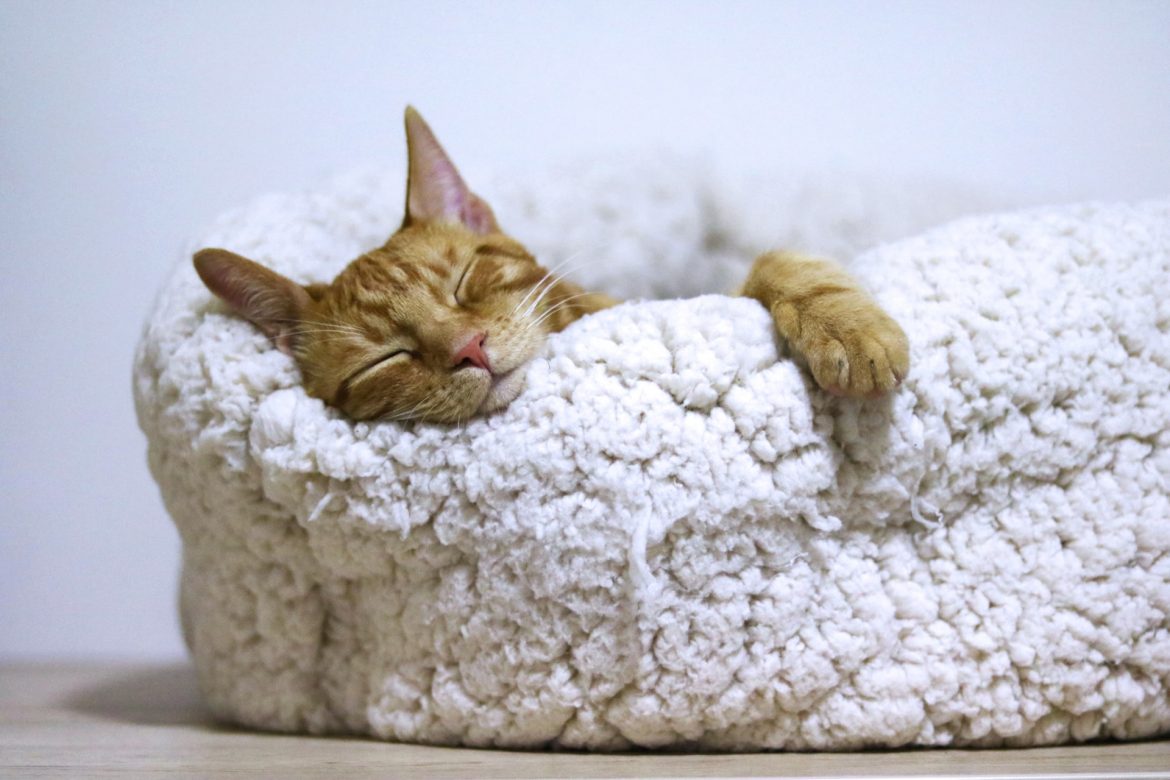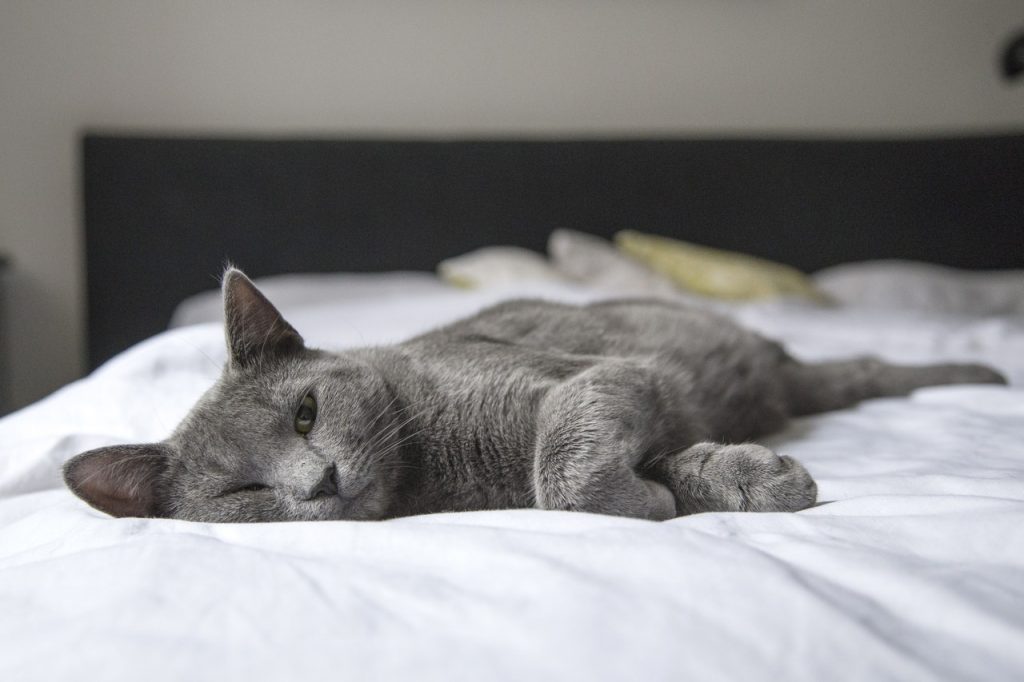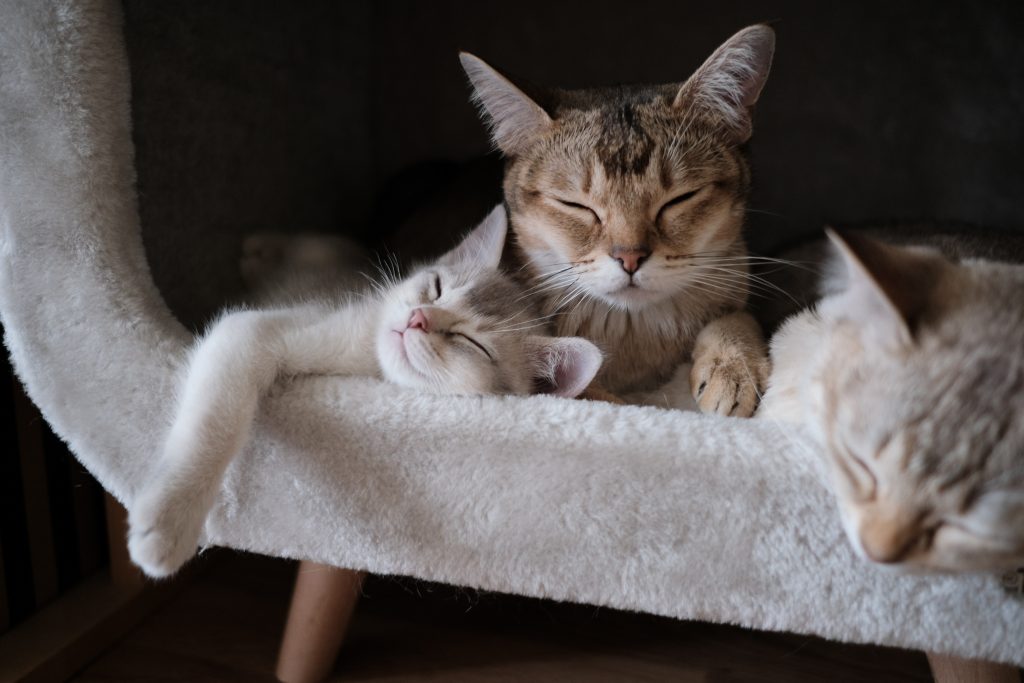
Cats are intriguing creatures. If you’ve ever had a cat, you might have noticed that they sleep most of the day and play at night. If you want to know what it means that cats are crepuscular and why they can sleep up to 20 hours, keep reading this article.
How much do cats sleep?
Cats sleep between 12 and 18 hours but almost 40% sleep even longer. Especially senior cats sleep longer because they need more time to regenerate and conserve energy.
Cats sleep polyphasically, which means they nap many times each day rather than once throughout the night. The length of these cat naps is around 78 minutes. However, cats generally slumber for periods ranging from 50 to 113 minutes on average.
Sleeping with Pets – Benefits, and Drawbacks
Cats sleep cycle
However, cats are active for some part of the day, and that’s because they are crepuscular. This means that cats are most active from dawn to dusk. Therefore, they are most active during the early morning, just before sunrise, and in the evening, just after sunset.
According to researchers, a cat’s crepuscular sleep cycle is designed by predatory natures. Therefore, cats have different sleeping cycles depending on the common prey animals they eat. For example, a cat’s crepuscular nature allows it to hunt diurnally active birds at dawn and nocturnal rodents in the evening.
Do cats sleep like humans?
Cats and humans can experience similar stages of sleep, for example, REM sleep. During this stage, their eyes move in both vertically and horizontally. Similar to humans, cats can also dream during the REM phase. When cats are in REM sleep, they may twitch or limp with a loss of muscular tone.
You’ve probably noticed your cat twitch, snore, hiss, or move its legs while resting if you’ve ever observed it sleeping. Many experts think that these movements are proof that cats dream.
In the non-REM sleep phase, cats can look like they are sleeping, but they are alert and responsive to the environment. Your cat may be sleeping throughout the day, but they’re always ready to pounce on any movement or sound.

Why do cats sleep next to you?
Contrary to popular belief, cats are very social animals, and a cat’s sleeping habits can adapt to the cat owner. Even if you and your cat are on different sleep schedules, you may notice that your cat likes to sleep near or in your bed. This might be an indication of trust or a sign that your cat is drawn to the heat provided by your body or blankets. According to research, cat owners who sleep with their cats have a more intimate relationship with humans than pet owners who do not.
When to be concerned about your cat’s sleep?
Natural reasons may cause your cat’s sleep patterns to alter. If your cat has been active for an extended time, it may be necessary for them to rest more than usual. Changes in your cat’s surroundings, such as a move or the addition of a new family member, might have an impact. Your cat will require more rest as they become older.
However, unusual sleep or excessive wakefulness patterns might indicate a more significant health concern. In addition, if your pet is sick, you may notice other changes in their behavior, including altered bathroom habits, confusion, or weight gain or loss.
How to Sleep When You Need to Study
What to do when your cat gets too much or too little sleep
Too much sleep
Kidney Disease: Kidney disease can cause cats to be louder at night, drink more water, and eat less food.
Deafness: Deaf cats sleep more, perhaps because the sound does not as quickly unsettle their sleep. Other signs include meowing during the day and night, a decline in appetite, and weight loss.
Hypothyroidism: Thyroid hormone deficiency can occur in both juvenile and adult cats. Lethargy, hair loss, and a decreased appetite can occur.
Too little sleep
Lack of Stimulation: If your cat is excessively hyperactive, particularly at night, they may not be sufficiently engaged during the day. It may be beneficial to play with them regularly. Some people also prefer to let their cats go outdoors to run around.
Hyperthyroidism: Hyperthyroidism in cats causes high levels of thyroid hormones. Your cat may become over-excited. They may also have an increased appetite, despite losing weight.
Feline Immunodeficiency Virus (FIV): Feline chronic wasting disease (FIV) affects domestic and wild cats by lowering their immune systems. This sickness causes cats to have difficulties sleeping and sleeps less overall.
When to Talk to Your Veterinarian
You are the most knowledgeable regarding your cat’s behavior. However, consult with your veterinarian if you notice an out-of-character shift, such as other symptoms. They can assist in determining the source of your cat’s changes and whether they are typical or require further study.

Conclusion
Cats are pretty mysterious animals. Cats may twitch, snore, hiss, or move their legs while resting in REM sleep, and this could be proof that cats dream. In non-REM phases of sleep, cats look awake but are still responsive to their environment. And why are cats sleeping next to humans so much anyway? It turns out there’s some science behind how our pets feel about us. If you sleep with your cat, you might have a closer relationship with them than if they slept elsewhere. Natural factors such as their age or mood don’t usually cause cats to change their sleep patterns, but changes in their surroundings can. So how can you tell if there’s something physically wrong with them? If your cat is acting unusually tired or energetic, it may have a health condition. Seek out your veterinarian if you notice any unusual behavior from your pet that could be related to their sleeping habits.
